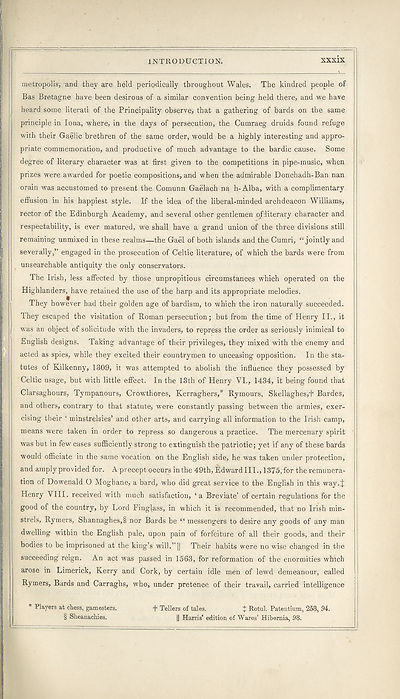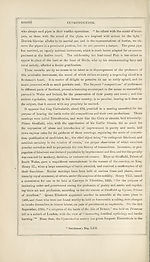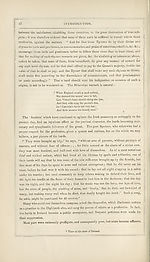Books and other items printed in Gaelic from 1871 to 1900 > Sar-obair nam bard Gaelach, or, The beauties of Gaelic poetry, and lives of the Highland bards
(51) Page xxxix
Download files
Complete book:
Individual page:
Thumbnail gallery: Grid view | List view

INTRODUCTION. xxxix
metropolis, and they are held periodically throughout Wales. The kindred people of
Bas Bretagne have been desirous of a similar convention being held there, and we have
heard some literati of the Principality observe, that a gathering of bards on the same
principle in Iona, where, in the days of persecution, the Cumraeg druids found refuge
with their Gaelic brethren of the same order, would be a highly interesting and appro¬
priate commemoration, and productive of much advantage to the bardic cause. Some
degree of literary character was at first given to the competitions in pipe-music, when
prizes were awarded for poetic compositions, and when the admirable Donchadh-Ban nan
orain was accustomed to present the Comunn Gaelach na h-Alba, with a complimentary
effusion in his happiest style. If the idea of the liberal-minded archdeacon Williams,
rector of the Edinburgh Academy, and several other gentlemen pfliterary character and
respectability, is ever matured, we shall have a grand union of the three divisions still
remaining unmixed in these realms—the Gael of both islands and the Cumri, “jointly and
severally,” engaged in the prosecution of Celtic literature, of which the bards were from
unsearchable antiquity the only conservators.
The Irish, less affected by those unpropitious circumstances which operated on the
Highlanders, have retained the use of the harp and its appropriate melodies.
They however had their golden age of bardism, to which the iron naturally succeeded.
They escaped the visitation of Homan persecution; but from the time of Henry II., it
was an object of solicitude with the invaders, to repress the order as seriously inimical to
English designs. Taking advantage of their privileges, they mixed with the enemy and
acted as spies, while they excited their countrymen to unceasing opposition. In the sta¬
tutes of Kilkenny, 1309, it was attempted to abolish the influence they possessed by
Celtic usage, but with little effect. In the 13th of Henry VI., 1434, it being found that
Clarsaghours, Tympanours, Crowthores, Kerraghers,* Rymours, Skellaghes,+ Bardes,
and others, contrary to that statute, were constantly passing between the armies, exer¬
cising their ‘ minstrelsies’ and other arts, and carrying all information to the Irish camp,
means w’ere taken in order to repress so dangerous a practice. The mercenary spirit
was but in few cases sufficiently strong to extinguish the patriotic; yet if any of these bards
would officiate in the same vocation on the English side, he was taken under protection,
and amply provided for. A precept occurs in the 49th, Edward II I.,1375, for the remunera¬
tion of Dowenald O Moghane, a bard, who did great service to the English in this way.7
Henry VIII. received with much satisfaction, ‘a Breviate’ of certain regulations for the
good of the country, by Lord Finglass, in which it is recommended, that no Irish min¬
strels, Rymers, Shannaghes,§ nor Bards be “ messengers to desire any goods of any man
dwelling within the English pale, upon pain of forfeiture of all their goods, and their
bodies to be imprisoned at the king’s will.”|| Their habits were no wise changed in the
succeeding reign. An act was passed in 1563, for reformation of the enormities which
arose in Limerick, Kerry and Cork, by certain idle men of lewd demeanour, called
Rymers, Bards and Carraghs, who, under pretence of their travail, carried intelligence
* Players at chess, gamesters. *1- Tellers of tales. + Rotul. Patent!um, 258, 94.
§ Sheanachies. || Harris’ edition of Wares’ Hibernia, 98.
metropolis, and they are held periodically throughout Wales. The kindred people of
Bas Bretagne have been desirous of a similar convention being held there, and we have
heard some literati of the Principality observe, that a gathering of bards on the same
principle in Iona, where, in the days of persecution, the Cumraeg druids found refuge
with their Gaelic brethren of the same order, would be a highly interesting and appro¬
priate commemoration, and productive of much advantage to the bardic cause. Some
degree of literary character was at first given to the competitions in pipe-music, when
prizes were awarded for poetic compositions, and when the admirable Donchadh-Ban nan
orain was accustomed to present the Comunn Gaelach na h-Alba, with a complimentary
effusion in his happiest style. If the idea of the liberal-minded archdeacon Williams,
rector of the Edinburgh Academy, and several other gentlemen pfliterary character and
respectability, is ever matured, we shall have a grand union of the three divisions still
remaining unmixed in these realms—the Gael of both islands and the Cumri, “jointly and
severally,” engaged in the prosecution of Celtic literature, of which the bards were from
unsearchable antiquity the only conservators.
The Irish, less affected by those unpropitious circumstances which operated on the
Highlanders, have retained the use of the harp and its appropriate melodies.
They however had their golden age of bardism, to which the iron naturally succeeded.
They escaped the visitation of Homan persecution; but from the time of Henry II., it
was an object of solicitude with the invaders, to repress the order as seriously inimical to
English designs. Taking advantage of their privileges, they mixed with the enemy and
acted as spies, while they excited their countrymen to unceasing opposition. In the sta¬
tutes of Kilkenny, 1309, it was attempted to abolish the influence they possessed by
Celtic usage, but with little effect. In the 13th of Henry VI., 1434, it being found that
Clarsaghours, Tympanours, Crowthores, Kerraghers,* Rymours, Skellaghes,+ Bardes,
and others, contrary to that statute, were constantly passing between the armies, exer¬
cising their ‘ minstrelsies’ and other arts, and carrying all information to the Irish camp,
means w’ere taken in order to repress so dangerous a practice. The mercenary spirit
was but in few cases sufficiently strong to extinguish the patriotic; yet if any of these bards
would officiate in the same vocation on the English side, he was taken under protection,
and amply provided for. A precept occurs in the 49th, Edward II I.,1375, for the remunera¬
tion of Dowenald O Moghane, a bard, who did great service to the English in this way.7
Henry VIII. received with much satisfaction, ‘a Breviate’ of certain regulations for the
good of the country, by Lord Finglass, in which it is recommended, that no Irish min¬
strels, Rymers, Shannaghes,§ nor Bards be “ messengers to desire any goods of any man
dwelling within the English pale, upon pain of forfeiture of all their goods, and their
bodies to be imprisoned at the king’s will.”|| Their habits were no wise changed in the
succeeding reign. An act was passed in 1563, for reformation of the enormities which
arose in Limerick, Kerry and Cork, by certain idle men of lewd demeanour, called
Rymers, Bards and Carraghs, who, under pretence of their travail, carried intelligence
* Players at chess, gamesters. *1- Tellers of tales. + Rotul. Patent!um, 258, 94.
§ Sheanachies. || Harris’ edition of Wares’ Hibernia, 98.
Set display mode to:
![]() Universal Viewer |
Universal Viewer | ![]() Mirador |
Large image | Transcription
Mirador |
Large image | Transcription
Images and transcriptions on this page, including medium image downloads, may be used under the Creative Commons Attribution 4.0 International Licence unless otherwise stated. ![]()
| Permanent URL | https://digital.nls.uk/109809685 |
|---|
| Description | Out-of-copyright books printed in Gaelic between 1631 and 1900. Also some pamphlets and chapbooks. Includes poetry and songs, religious books such as catechisms and hymns, and different editions of the Bible and the Psalms. Also includes the second book ever published in Gaelic in 1631. |
|---|

